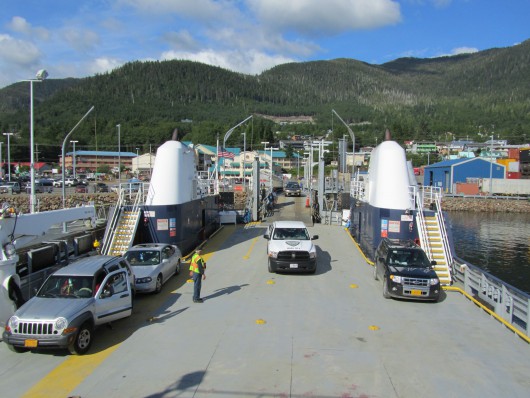
The ferry Lituya loads vehicles onto its car deck at the Ketchikan Ferry Terminal before sailing to Metlakatla. (Photo by Linda Hall/Alaska DOT&PF)
The Alaska Marine Highway System is changing the way passengers pay for sailings on one southern Southeast route.
Spokesman Jeremy Woodrow said the change impacts those riding the small ferry Lituya, which sails between Metlakatla and Ketchikan.
“You pay round trip when you’re going one direction and then it’s a free trip going the other direction,” he said. “This seemed like a good solution because, when you’re driving in the Lower 48 on toll bridges, it’s not uncommon to have a fee going one way and then (it’s) free in the other direction on toll bridges and actually toll roads as well.”
The Annette Island Ferry Terminal, which serves Metlakatla, is unstaffed, so travelers can’t buy tickets there.
Woodrow said the Lituya’s crew is too small to handle sales.
The system tried to find a contract vendor in Metlakatla without success, he said. That left few options.
“While they can still do it online, many of the customers who travel from Metlakatla to Ketchikan use cash primarily as their main way of purchasing tickets,” he said. “So they can’t actually purchase their tickets until they get to Ketchikan where they can go into the terminal.”
The 180-foot-long Lituya is the ferry system’s only one-route ship. It sails five days a week. The annual passenger count is about 30,000 a year, about 15,000 each way.
Woodrow said the new ticket policy will probably go into effect in January.
Metlakatla has about 1,500 residents.
What’s officially called the Metlakatla Indian Community is the region’s largest Tsimshian city.
Ferry officials are still looking for a solution to a similar problem affecting Angoon and some other small port communities.
Those towns also don’t have staffed terminals. And sailings head to multiple ports, so the Metlakatla solution won’t work.
Woodrow said ferries serving those communities have enough staff to take tickets. But problems remain for those without computer access.
“So the purser will meet them at the top of the vehicle ramp, take their names if they don’t have a ticket already, and then make sure to find them on that route,” he said. “Obviously, we would prefer to have people paying in advance.”
He said the ferry system is looking into installing ticket kiosks in some communities.





